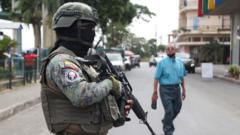In a tense political move, President Trump has announced the deployment of the National Guard to Washington, D.C., claiming the city faces a public safety emergency.
Trump's National Guard Deployment: A Controversial Crime Response in DC

Trump's National Guard Deployment: A Controversial Crime Response in DC
President Trump announces National Guard deployment amid crime crackdown claims.
In an escalating move, President Donald Trump declared a "public safety emergency" on Monday, activating 800 National Guard troops to bolster law enforcement in Washington, D.C. This decision comes amid Trump's claims of a rise in crime and homelessness, referring to the situation as one of "complete and total lawlessness." Despite his assertions, local statistics indicate a decline in violent crime, reaching a 30-year low.
During a press conference, Trump insisted on the need for federal intervention, proclaiming, "I'm announcing a historic action to rescue our nation's capital from crime, bloodshed, bedlam, and squalor." He criticized the city's conditions, suggesting an influx of "violent gangs and bloodthirsty criminals." However, D.C. Mayor Muriel Bowser refuted these claims, pointing out a drop in crime rates and rejecting the notion of a crime wave.
Bowser, highlighting the positive trends, noted that homicides had dropped significantly in 2023 and that any crime spike mirrored national trends rather than a localized epidemic. She characterized Trump's comments as exaggerated, stating, "Any comparison to a war-torn country is hyperbolic and false." Despite the local government's efforts, Trump plans to place the city’s police under direct federal control, referencing the District of Columbia Home Rule Act.
While activists and locals express concerns over the appropriateness of the National Guard's involvement in civilian law enforcement, Trump also aimed to address homelessness in the capital. He mentioned plans to remove homeless individuals without specifying where they would go, a point met with skepticism from local services that had recorded a decline in homelessness over the past five years.
Outside the White House, protests erupted against Trump's actions, with demonstrators chanting "protect home rule" and arguing that the President's priorities are more about asserting control than addressing community safety. Ralliers expressed fears over the implications of federal oversight on D.C.'s law enforcement.
Historically, Trump has previously deployed the National Guard in response to civil unrest, making this latest move part of a pattern of federal intervention in local matters. As tensions rise, the consequences of Trump's declaration remain to be seen, with potential implications for Washington, D.C.'s governance and community safety.
During a press conference, Trump insisted on the need for federal intervention, proclaiming, "I'm announcing a historic action to rescue our nation's capital from crime, bloodshed, bedlam, and squalor." He criticized the city's conditions, suggesting an influx of "violent gangs and bloodthirsty criminals." However, D.C. Mayor Muriel Bowser refuted these claims, pointing out a drop in crime rates and rejecting the notion of a crime wave.
Bowser, highlighting the positive trends, noted that homicides had dropped significantly in 2023 and that any crime spike mirrored national trends rather than a localized epidemic. She characterized Trump's comments as exaggerated, stating, "Any comparison to a war-torn country is hyperbolic and false." Despite the local government's efforts, Trump plans to place the city’s police under direct federal control, referencing the District of Columbia Home Rule Act.
While activists and locals express concerns over the appropriateness of the National Guard's involvement in civilian law enforcement, Trump also aimed to address homelessness in the capital. He mentioned plans to remove homeless individuals without specifying where they would go, a point met with skepticism from local services that had recorded a decline in homelessness over the past five years.
Outside the White House, protests erupted against Trump's actions, with demonstrators chanting "protect home rule" and arguing that the President's priorities are more about asserting control than addressing community safety. Ralliers expressed fears over the implications of federal oversight on D.C.'s law enforcement.
Historically, Trump has previously deployed the National Guard in response to civil unrest, making this latest move part of a pattern of federal intervention in local matters. As tensions rise, the consequences of Trump's declaration remain to be seen, with potential implications for Washington, D.C.'s governance and community safety.





















